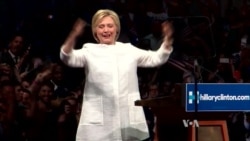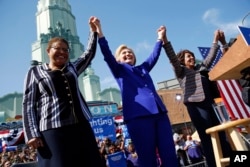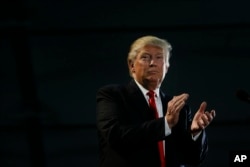Donald Trump and Hillary Clinton have spent the past four months defeating their rivals in state contests and now have five months to focus solely on each other as they battle to become the next president of the United States.
Each faces challenges before the Nov. 8 national vote.
Clinton's most immediate task is convincing the passionate supporters of Vermont Senator Bernie Sanders to back her after their hard-fought battle for the Democratic Party nomination.
"I think in the next couple of weeks for sure we will see him in effect concede the nomination to her, and I suspect he will begin to try to bring his supporters on board fairly rapidly, certainly before the convention," Robert Smith, professor of political science at San Francisco State University, told VOA.
WATCH: Clinton claims victory in Democratic presidential race
Eight years ago, Clinton was in Sanders' position, having lost the nomination to Barack Obama. She helped campaign for Obama as he defeated John McCain for the presidency.
Democratic strategist Garry South says Clinton also has to give voters a reason to like her, or at least to not dislike her.
"She has to really work on I think turning around some of her unfavorables and some of the negative impressions about her, and I think that can be done as evidenced by the fact that Donald Trump did it in the Republican primaries," he told VOA.
South said for Trump, his challenge is himself.
“The real question is, can this guy who has shown a total lack of discipline -- particularly a total lack of message discipline during this entire primary process -- can this man get on message and stay on message, and stop shooting his mouth off and shooting himself in the foot and getting not only him but his entire party in trouble? I suspect that’s a problem that’s going to plague this guy from now until November.”
Smith said he expects Trump to continue what he did during the primaries, with a general election campaign that is "polarizing and divisive."
"I think he has to begin to run a more traditional campaign. I know he’s reluctant to do that because running a traditional campaign has not gotten him where he is, but I think the consensus of most people is if he wants to go forward and have a shot at winning the presidency he has to run a more traditional and less spontaneous campaign.”
Unify the party
Trump also faces questions about uniting his party. He effectively became the Republican nominee more than a month ago, but party leaders have been slow to endorse him, including House Speaker Paul Ryan who said only last week that he will vote for Trump. Other figures such as 2012 Republican presidential nominee Mitt Romney have openly opposed Trump's candidacy.
South pointed to down-ballot races, candidates who are trying to get elected on November 8 to Congress, as state governors or to state legislatures, and the choices they have in whether to stand by party's presidential pick.
"I think you’re going to have a lot of lip service endorsements," South said. "I think you’re going to have people saying yes I’m going to vote for the nominee without even using Donald Trump’s name, and that’s happening now. But how actively those Republican office holders from state to state will actually go out and support Donald Trump and be seen with him and campaign with him remains to be seen.”
Millions of people voted in state primaries, but in November many more voters will turn out. That means candidates have to shift their focus from appealing largely to party members to the wider audience that is not as partisan.
“A primary election is not the same as a general election and you cannot extrapolate from what happened in the primary in terms of what will happen in the general election," South said.








